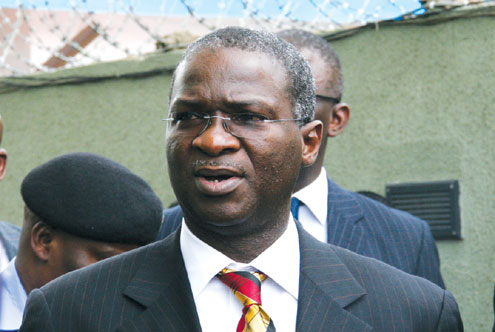The Socio-Economic Rights and Accountability Project (SERAP) has asked Mrs. Fatou Bensouda, Prosecutor, International Criminal Court (ICC), to use her “good offices and leadership position to investigate whether the allegations of widespread, systematic and large-scale corruption in the electricity sector since the return of democracy in 1999 and under the governments of former presidents Olusegun Obasanjo, Umaru Musa Yar’Adua and Goodluck Jonathan in Nigeria amount to crimes against humanity within the jurisdiction of the International Criminal Court, and to prevail on the Nigerian government to surrender all suspected perpetrators for trial by the ICC.”

Nigeria is a state party to the Rome Statute and deposited its instrument of ratification on 27 September 2001. In the petition dated Wednesday, August 16, 2017 and signed by SERAP deputy director, Timothy Adewale, the organisation said: “Allegations of corruption in the electricity sector in Nigeria have had catastrophic effects on the lives of millions of Nigerians, akin to crimes against humanity as contemplated under the Rome Statue and within the jurisdiction of the Court.”
According to SERAP, “The Rome Statute in article 7 defines ‘crime against humanity’ to include ‘inhumane acts causing great suffering or injury,’ committed in a widespread or systematic manner against a civilian population. The common denominator of crimes against humanity is that they are grave affronts to human security and dignity. Therefore, the staggering amounts of public funds alleged to have been stolen over the years in the electricity sector create just these consequences. Crimes against humanity are not only physical violence; allegations of corruption in the electricity sector hold a comparable gravity, which the Prosecutor should examine and thoroughly investigate.”
The petition reads in part: “The elements that need to be established to prove a “crime against humanity “under article 7(1)(k) of the Rome Statute are that, the perpetrator inflicted great suffering or serious injury by means of an inhumane act; that the perpetrator was aware of the circumstances, and that the act was committed within a widespread or systematic attack on a civilian population; and that the perpetrator knew of that link.
“The consequences of allegations of corruption in the electricity sector are similar to those of the offences in article 7(1). Corrupt officials and corrupt contractors in the electricity sector know well that their conduct is criminal and injurious, and the denial of human dignity coupled with a radical breach of solemn trust, aggravate their alleged crime.
“SERAP considers these allegations of widespread and systematic corruption in the electricity sector as amounting to crimes against humanity and therefore clear violations of the provisions of the Rome Statute of International Criminal Court. SERAP believes that these allegations have given rise to individual criminal responsibility of those suspected of perpetrating corruption in the electricity sector, as entrenched in the Rome Statute of the International Criminal Court.
“SERAP considers the apparent failure of successive governments and high-ranking government officials to prevent widespread and systematic corruption in the electricity sector as amounting to complicity under the Rome Statute.SERAP therefore believes that the widespread and systemic nature of large scale corruption in the electricity sector fits the legal requirements of a crime against humanity.
“The 2006 Commonwealth working group on asset repatriation specifically refers to corruption including in the electricity sector being defined as an international crime. SERAP believes an international investigation by the ICC would complement the anticorruption initiatives by the current government and contribute to ending a culture of impunity of perpetrators.
“SERAP believes that substantial grounds exist to warrant the intervention of the Prosecutor in this case. Pursuant to the Rome Statute, the Prosecutor has power to intervene in a situation under the jurisdiction of the Court if the Security Council or states parties refer a situation or if information is provided from other sources such as the information SERAP is providing in this case.
“SERAP is seriously concerned that the instances of corruption highlighted above and details of which are contained in the enclosed From Darkness to Darkness report are not isolated events, but illustrate the widespread and systematic nature of large scale corruption in the electricity sector under the governments of former presidents Olusegun Obasanjo,Umaru Musa Yar’Adua and Goodluck Jonathan. This level of corruption has limited access to and affordability of electricity in Nigeria.
“Widespread, systemic and large-scale corruption in the electricity sector and the lack of transparency and accountability in the use of public funds to support the operations of Discos have resulted in regular blackouts and disproportionately affected the most disadvantaged and vulnerable sectors of the population who cannot readily afford expensive generators in order to have a reliable power supply. The situation is not likely to improve considering that the production of electricity is not proportionate with the rapidly growing population.”
SERAP therefore asked Ms Bensouda to:
- Urgently commence an investigation proprio motu on the allegations of widespread and systematic corruption in the electricity sector since the return of democracy in 1999, with a view to determining whether these amount to crimes against humanity within the Court’s jurisdiction. In this respect, she is urged to invite representatives of the Nigerian government to provide written or oral testimony at the seat of the Court, so that the Prosecutor is able to conclude since available information whether there is a reasonable basis for an investigation, and to submit a request to the Pre-Trial Chamber for authorisation of an investigation;
- Bring to justice those suspected to be responsible for widespread and systematic corruption in the electricity sector in Nigeria;
- Urge the Nigerian government to fulfil its obligations under the Rome Statute to cooperate with the ICC; including complying with your requests to arrest and surrender suspected perpetrators of widespread and systematic corruption, testimony, and provide other support to the ICC.
